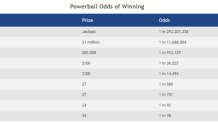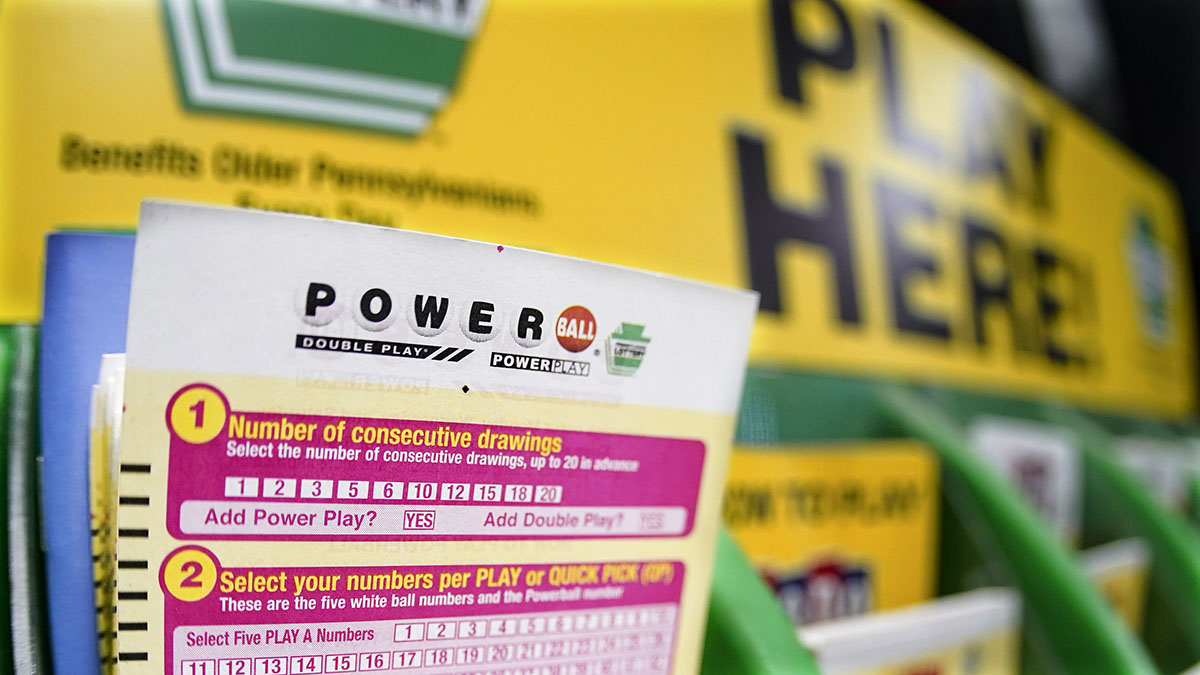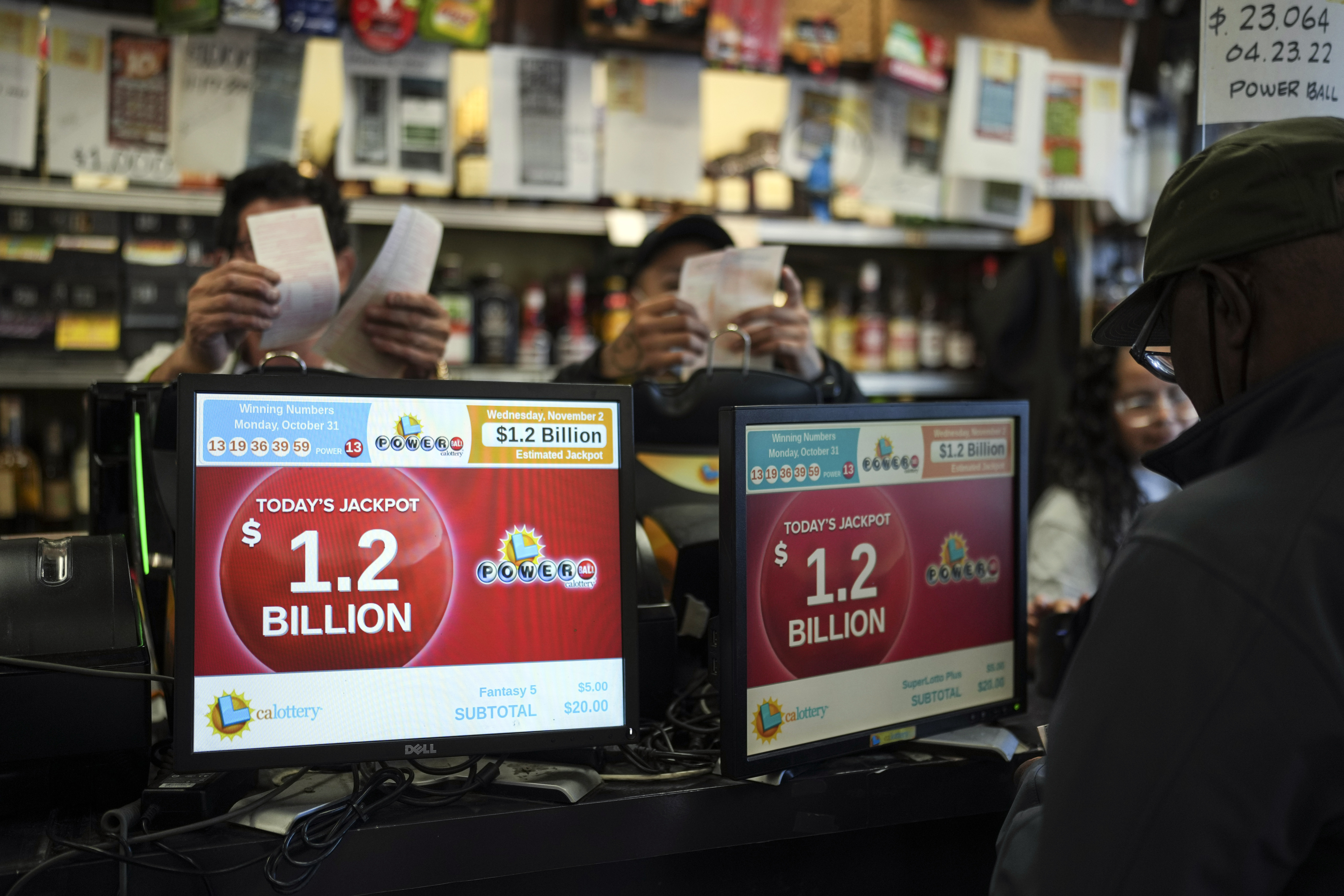First, it was serious. Then it got really serious. Next came billion-dollar serious. Now we just ... can't.
The Powerball jackpot has now climbed to a world-record $1.6 billion ($782 million cash), according to lottery officials, and could even top that by the time Saturday's drawing rolls around. It's only the second time in the game's history that the Powerball jackpot has hit $1 billion or more and officially marks the largest jackpot in U.S. lotto history.
You've got until 10 p.m. ET Saturday to get your tickets (most retailers cut off sales an hour before the 10:59 p.m. ET drawing) but you may want to get them early just in case. Just think about what you could buy with cash!
Only two other lotto jackpots have topped the $1.5 billion mark -- a $1.537 billion Mega Millions with a lone winner from South Carolina in 2018 and a three-way Powerball $1.586 billion jackpot split between ticket-holders in California, Florida and Tennessee. Saturday marks the 40th run in this Powerball series.
Get Connecticut local news, weather forecasts and entertainment stories to your inbox. Sign up for NBC Connecticut newsletters.
Sure, millions will play. But there is good news (sadly, we're not talking about the tax bill).
First, you've got a better shot at winning the Powerball jackpot (1 in 292,201,338) than you do the Mega Millions (1 in 302,575,350). Yeah, neither lottery has great odds, but someone -- or someones -- always win eventually.
And with the jackpot so high already, you automatically have an even better chance. Lottery Universe, which bills itself as an information service on these games, says once the haul hits the $630 million mark, the statistical chances of winning at least something go up. You might not make a ton, say 30 cents on a $2 ticket, but it's still a profit.
Over the past five draws, New York has had an average of 321,144 winners per draw, meaning the total winners for Wednesday's Powerball draw was around 70.87% higher than average, according to Powerball.net. New Jersey had an average of 199,671 winners per draw, which was about 72% above average. Considering Connecticut only accounted for 1.34% of all Powerball winners in Wednesday's draw, you might want to try an alternative point of purchase.
Or maybe the Constitution State is due.
Wherever you end up buying your ticket, there are some oft-touted strategies when it comes to choosing your numbers. If you don't have your heart set on any digits in particular, we've got some tips. And if you do have your heart set on certain numbers, these strategies may make you reconsider. (Here are the Powerball game rules.)

8 Tips for Choosing Powerball Numbers
As for snaring the jackpot, you may need to try a few different strategies. If you're looking for the most common Powerball numbers, statistics show that over the last seven years, those are 61 (78 times), 32 (77 times), 21 (73 times), 63 (73 times), 69 (71 times) and 23 (70 times). All but the first of those numbers were last drawn this month.
For the Powerball selection, the most common numbers are 24 (44 times), 18 (42 times), 4 (36 times), 21 (34 times), 10 (33 times) and 6 (33 times). Those trying to capitalize on a number that's been "cold," meaning it hasn't shown up in a minute, would be wise to look at 24 and 21 for their Powerball selections. Those two haven't come up since mid-August and mid-July, respectively, data shows.
Which are the least common Powerball numbers? We don't need to tell you to avoid those, which are 26, 34, 13, 46, 4 and 24, based on the last seven years of data. The least common Powerball numbers are 23, 12, 15, 7, 16 and 20.
Sometimes we're just due -- and so are numbers. Data shows the most overdue main numbers are 39, 1, 57, 47, 50 and 12, while 8, 23, 17, 13, 21 and 3 are the most overdue numbers for the Powerball.
If you're one of those people who always opts for numbers around birthdays, it's time to shake up your gameplay. Why? Those are dates, which means you limit your number range to between 1 and 31 -- and those would cut you off from three of those first five most frequently picked numbers.
All good things come in pairs, right? And some numbers pairs appear more likely to come up in Powerball, according to Powerball.net. Six pairs of numbers have come up at least 10 times since 2015 -- 32/58, 8/27, 7/15, 36/61, 51/61 and 37/44. Yeah, we see that 61 in there twice, too. Hmmmm. The most common consecutive pairs are 21/22, 41/42, 61/62, 62/63, 68/69 and 56/57, though the data suggests you'd be better off choosing ones out of numerical order.
Three sets of triplets have hit four times, if you're feeling extra adventurous: 7/15/36, 12/20/21 and 1/3/13.
What about odds and evens, you ask? According to Lottery Universe, your best bet is to go with two even numbers and three odd or vice versa. Those work out nearly 33% of the time, while all even or all odd numbers only get called 2.6% of the time or less, according to the lotto website.
Don't go with quick-pick. All numbers aren't created equal in this method, one man who hit the lotto grand prize seven times (yes, really) told Forbes. A different set is generated with each quick pick, which lowers your odds every time.
Stick with your gut. Can you imagine choosing the right numbers, second-guessing yourself and switching them only to realize you would have hit a much larger prize if you stuck with your original choices? If you've got a feeling about a number or numbers, stick with them -- just try to differentiate your choices enough to spread them over a few tickets.
Here are some other smart play options, for those who like to get super involved in the details. And remember, you can't win if you don't have a ticket. The window closes at least 59 minutes before the draw, so think 10 p.m. ET.
Powerball is played in 45 states plus Washington, D.C., the Virgin Islands and Puerto Rico. Drawings are held each Monday, Wednesday and Saturday at 10:59 p.m.
The jackpot was last won on Aug. 3, when a ticket in Pennsylvania earned $206.9 million. Since then, the game has had dozens of drawings without a grand prize winner. Saturday's drawing will be the 40th draw in the jackpot run.
The $1.6 billion prize refers to the annuity option, paid over 29 years. Nearly every big winner takes the cash option, which is currently estimated at $782 million. Either prize option would also be subject to taxes.
Since the start of the current jackpot rollup on Aug. 6, New York sales have been $158.9 million (7.78%) of the $2.04 billion across all participating Powerball jurisdictions leading up to Wednesday’s drawing. Aid to education from New York’s ticket sales during the same time period totals more than $55.62 million. Local winners have abounded.




